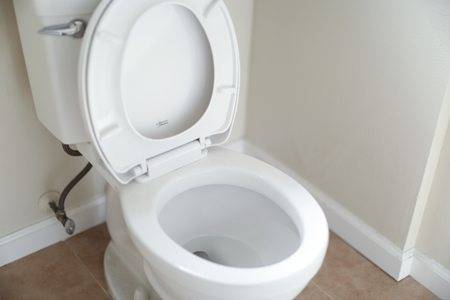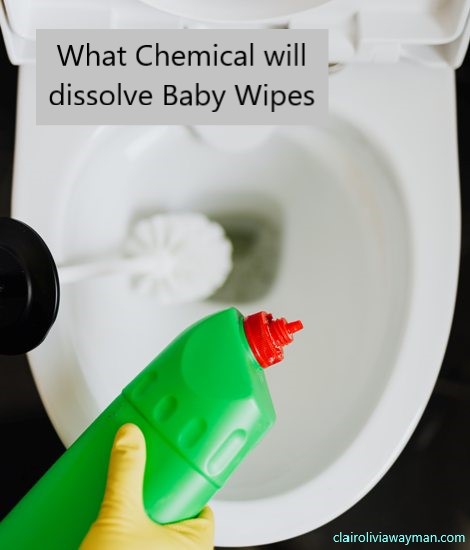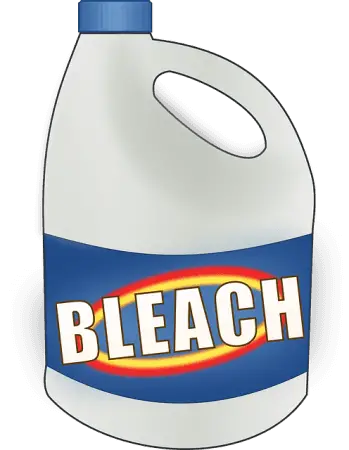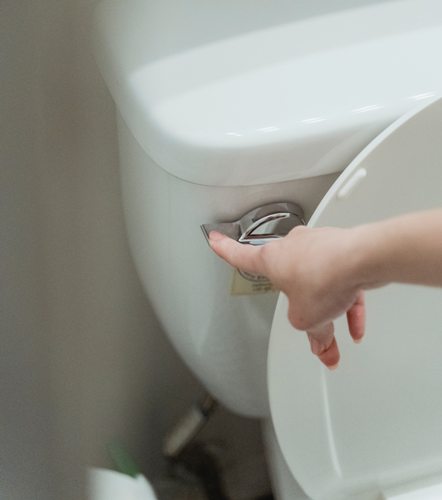Commercial wet tissue is not solvable in water as it serves a deep cleaning purpose. Thus, wet cloth is very convenient and safe when using it to sanitize baby’s bums or remove makeup because it requires no shredded paper stick on the sensitive skin.
However, the producer warns not to flush the tissue clout down the bowl due to its durable materials. But, does anything dissolve baby wipes in the septic tank or toilet? This question creates an arguable topic with many contradictory opinions.
Keep on reading because I will shed light on the question in my post.

Table of Contents
What Chemical Will Dissolve Baby Wipes?

When the tissue clout clogs the toilet or tank’s pipe, they may cause water overflows in your restroom. It is such a horrible accident that you have to handle it immediately.
Can heavy chemicals or high-quality drain cleaner break down the stretchy, stubborn materials of baby rags? How to dissolve baby wipes in septic tank? Let’s figure it out!
Use Bleach
On the overview, bleach has been a handy solution that you can find in any store.
Factories and households usually use bleach in various cleaning processes, such as whitening clothes and clear out sturdy stains. But can bleach destroy the enduring constitution of wet tissue?

To answer the question, we will take a look at how the bleaching process operates. Bleach works as a vital factor in promoting oxidation. It oxidizes the matters during the attachment.
Consequently, housekeepers often use it to break down paper towels stuck in the toilet. Bleach can also dissolve hair, feces, and grease.
Moreover, bleach is tank-friendly and suitable for both industrial and domestic usage.
On the other hand, bleach’s powerful effect can only stop at fiber material that contains acidic properties. Meanwhile, the elements constructing commercial baby rags are nonwoven fabric.
Plastic, such as polyester or polyethylene, can appear in the wipes’ ingredient list, too, as it improves the resistance effectively. Those factors inhibit the chemical interaction between bleach and fiber. As a result, bleach can not dissolve baby patches.
However, you can still see bleach tear out gauzes into smaller pieces because there are still acidic fiber molecules in commercial wipes. After tearing the wipes, you can scoop the rest out of the toilet bowl effortlessly to unclog the pipe.
In short, even though bleach conducts some chemical interaction with baby mulls, it cannot dissolve them entirely.
Use Lye
Generally speaking, I consider lye as a considerably strong chemical solvent. Like bleach, lye is available in your local grocery shop, or it’s already in your home’s storage. However, this powerful solvent’s mechanism is completely different from bleach, common soap, or dish wash.
But first, I have to remind you that lye is the harshest chemical among other domestic cleansing products. It can release harmful gas or bring up the boisterous effect during the reactive process.
So it is necessary to wear gloves and goggles in advance to protect your skin and eyes.
Overall, lye is a metal hydroxide which is conventionally used in the hygienic industry. To be more specific, it is a solution that has alkaline features. As an effect, lye can dissolve many globs that prevent the flow in the water pipes.
The alkaline characteristic can even destroy or melt several metals such as copper, aluminum, and Teflon. Many experiments prove that it shows the effect on damaging iron and plastic foams, too.
Though, whether lye can corrode baby gossamer or not is unsure. It depends on which matters are in the gossamer. While lye can eat up a specific kind of plastic, many other categories are not vulnerable to lye’s abrasiveness.
Unfortunately, marketed baby wipes are often lye- resistant as far as I know. So, I would not recommend using lye because the result is unknown.
Besides, it would be best to consider the risk to your family well-being. The toxic fumes and other by-products are extremely dangerous.
Use Sulfuric Acid
Sulfuric acid ranks the best drain opener in the market. You may not see it in common stores, but you can go to hygenic companies and make an order. You can seek sulfuric acid solvent under the popular alternative name: Vitriol.
The manufacturer advertises this product as an effective cleaner that can erode numerous drain stoppages, namely, paper, leftover foods, oil stains, and hair clots.
It can wear down some metals like how the lye does. Yet, you can use it on your drainage system as sulfuric acid is still plastic pipe- friendly. But can this acid corrode baby wipes? – Will sulfuric acid dissolve baby wipes?
Congratulations! The answer is yes. Sulfuric acid is the only chemical cleaner that can dissolve baby wipes till now. But please do not forget to read the label because not every vitriol solution is the same.
In detail, many products include sulfuric acid as one of the components. However, the percentage varies. The toughest one on the market is 98% acid, and the rest is water. This product will guarantee the result in dissolving baby wipes.
Still, I have to put a caution tag here due to the potent feature of the acid. You have to prepare safety accouterments such as gloves and face masks. I suggest wearing a lab coat for extra carefulness.
It is essential to keep your children away from the area and open doors and windows to ventilate air.
After that, you pour a small amount of Vitriol slowly into the toilet bowl or the septic sink. The recommended measurement is approximately 200 ml for slightly obstructed pipes. You can increase the amount of solvent to 500 ml in case of severe congestion.
Let the acid do its job for 10 seconds and pour a little water in gradually. You then observe the fluid to evaluate the eroding process while maintaining a distance to avoid the sharp smell.
If you see the sanitary napkins are still there, you should allow the solvent to work for a longer period. The chemical reaction may take you from 20 minutes to an hour. Once the lumps break down completely, flush the toilet or septic tank to discard the leftover.
Read: Can You Flush Paper Towels – All You Need To Know
How To Get Rid Of Baby Wipes

There are many ways you can handle sanitizing cloth stuck in your toilet. First and foremost, the easiest method is to drag the fabric out by hand.
It may feel uncomfortable when you have to touch the waste and the toilet water, yet I consider this method the most effective one as you do not have to contact any potent chemical. Besides, you can wear gloves to protect your hands.
Another way is to utilize the toilet auger to pull out the wipes. This procedure is ideal for wipes that lie in the deep parts of the toilet.
The pitfall is that you have to be an experienced janitor to work with this extended hook. Otherwise, you can push the tissues down the pipes instead of pulling them up.
About toiletry devices, I have to mention a simple yet effective plunger. Almost every family has one in the bathroom.
This gadget works by creating a powerful suction force that can loosen the clogged tissues. After that, you can grab the tissues in the bowl and throw them away easily.
In case there is a huge amount of fabrics, plus water overflow, I think you should not hesitate to call the cleaning services. The staff will come and handle the situation better and faster than you do.
Although the fee may be costly, the professional worker knows how to discard the wipes, disinfect your restroom, and maintain your pipe system.
Also read: Is Wd 40 Safe For Septic Tank and How to Maintain Septic System?
Can You Flush Baby Wipes?

Biodegradable Wipes
The industry has changed dramatically into disposable products following the consumers’ behaviors after many environmental protection campaigns.
Accordingly, the market offers biodegradable wipes from plant-based fibers such as standard cotton, wood, and bamboo cellulose. Eco-friendly tissues claim many benefits, such as preventing skin irritation, stretchy substance but still disposable.
Nevertheless, the disposing process still requires tremendous effort and special conditions. For instance, workers have to grind the cloth into small pieces and expose them to high heat like incinerators.
People often misunderstand the disposable tag as corrodible in water. Notwithstanding, they are distinctive mechanisms. Thus, biological wipes can not be flush down the septic tank, as it can block the flow instantly.
Wipes Contain Plastic
More than 90% of the commercial wipes comprise plastic. Plastic and its variants, such as polyester, create a considerably strong structure. Hence, you can not disperse the wipes by immersing them in water or any other domestic solvent.
The baby wipes are usually tiny and thin, so many people try to flush them and think they can go through the pipes effortlessly. Some individuals share their anecdotal experience: They flush the wet tissues and do not see water spilling in their toilets.
However, as soon as it reaches the pipe with a smaller circumference, it hinders the whole system. Once you flush the plastic wipes, it is extremely cumbersome to detect the congestion spot and extract the lump.
In short, flushing wipes, no matter how small they are, can damage the septic system.
Read: Worst Toilet Paper For Septic Systems You Need To Avoid
The Bottom Line
I have shown you my perspective regarding the argument: “What dissolves baby wipes in the septic tank or toilet?”. I hope you can attain the appropriate answer to this problem as no one wants to see the pipe system destroyed by a gob of tissues.
Due to the strong resistance materials, wet tissues can only disintegrate in a few potent chemicals. The process also requires extreme caution because there are many harmful by-products such as fumes and leftovers.
Alternatively, you can handle the tissues manually as my instruction above. With the help of some sanitizing tools, I believe the situation would be manageable.
Good luck in handling the clot, and I will see you soon in Clairoliviawayman‘s next post.
Related Post:
- Can You Flush Hair Down The Toilet?
- Can You Flush Tissues Down The Toilet?
- Can You Flush Coffee Grounds Down the Toilet?
- Can You Pour Olive Oil Down The Drain? – Unveiling the Million-dollar Question
- How To Remove Urine Stains From Toilet Seats Step By Step
- How To Clean Clogged Toilet Pipes – An Ultimate Guide
- How To Clean Pebble Stone Shower Floor – Completed Guides For Homeowners
- How To Retile A Shower Floor: Thorough Guide And Tips
- How to Clean Textured Shower Floor – An Easy Step-To-Step Guide
- How To Clean Soap Scum Off Glass Shower Doors
- Is Toilet Water Clean? – The Hidden Facts To Discover
- How To Keep Bathroom Clean With Roommates – Excellent Tips To Follow
- Can You Use Toilet Bowl Cleaner on A Bathtub – The Etiquette Answer
